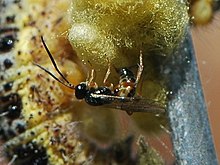Lysibia nana
| Lysibia nana | |
|---|---|

| |
| Scientific classification | |
| Kingdom: | |
| Phylum: | |
| Class: | |
| Order: | |
| Family: | |
| Subfamily: | |
| Tribe: | |
| Genus: | |
| Species: | Lysibia nana |
Lysibia nana is a hyperparasitoid wasp that attacks the parasitoid wasp Cotesia glomerata.[1]
L. nana reproduces sexually and only infects hosts in the family Braconidae. Adult females of this species do not feed from their host, but rather rely on sources of nectar in their environment. L. nana females find hosts by detecting chemical signals, such as kairomones (usually intra-specific pheromones of the host) or herbivore-induced plant volatiles (HIPVs) that are released by plants when they are attacked by herbivores. Females are attracted to plants that have been attacked by caterpillars infected by C. glomerata. Once a suitable host has been found, the L. nana female lays an egg in a C. glomerata larva.
References
- ^ Harvey, Jeffrey A. (2008-03-01). "Comparing and contrasting development and reproductive strategies in the pupal hyperparasitoids Lysibia nana and Gelis agilis (Hymenoptera: Ichneumonidae)". Evolutionary Ecology. 22 (2): 153–166. doi:10.1007/s10682-007-9164-x. hdl:20.500.11755/5ca84a4e-f3c1-4a87-a0c4-49825b38143b. ISSN 0269-7653.
